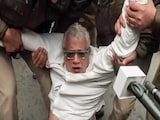Over 100 bodies have not been identified after the Odisha train accident on Friday, one of India's deadliest ever, in which 278 people were killed.
It has been more than 80 hours and officials are debating how much longer the bodies, many of them dismembered and mangled, can be kept for relatives to identify them. To give the families more time, the bodies are being embalmed. Blood samples are also being collected for DNA matching.
A senior doctor from the premier AIIMS hospital, Delhi, said it was "not advisable" to keep damaged bodies too long as even embalming wouldn't help.
A Shariff, the Head of Department, Anatomy, AIIMS, said a body could be preserved "for years" only if the embalming is done correctly, within 12 hours.
"Decomposition depends on a number of factors, including ambient temperature. Bodies are fine for seven-eight hours, even 12 hours, provided the temperature is not too high. Ice and cold storage delay decomposition," Dr Shariff told NDTV.
The AIIMS hospital in Bhubaneswar has called for at least five freezers from Paradip Port to slow down the decay of the bodies brought in after the horrific three-train crash in Balasore on Friday evening.
Grieving families have struggled to identify bodies damaged beyond recognition from a slideshow of images shown to them by officials.
"If embalming is not done for more than 12 hours after death, it is not effective and the decomposition is very quick. If the body is damaged, it is very difficult to embalm it. Fluids have to be injected locally. It is not advisable to keep the bodies too long," Dr Shariff said.
Running out of time, the railways have advised relatives to dial 139 to try and identify people who died.
The AIIMS, Bhuvaneswar, received 123 bodies on Sunday.
"By the time AIIMS received the bodies, 30 hours had already passed. Our prime objective was to prevent further decay of the bodies. The bodies were kept in cold storage and embalming was done on a war footing," AIIMS Executive Director Ashutosh Biswas said.
The bodies would be stored in the freezers, said Dr Biswas. Each container - usually meant for shipping fish, meat or other perishable goods - can store 30-40 bodies.
He said experts from several hospitals and various cities had arrived to help preserve the bodies.















